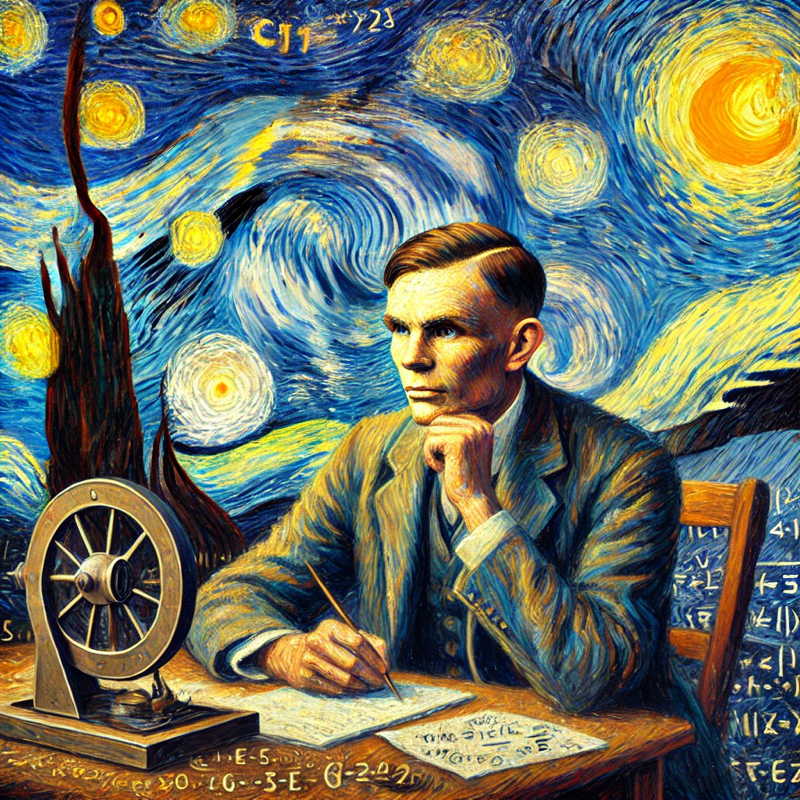Alan Turing: A Genius Undone by Stigma
Alan Turing, a computing pioneer, was persecuted for his identity despite his brilliance. Criminalized instead of honored, stigma led to his tragic end. This post explores his achievements, struggles, and lessons on resilience, reminding us that change is possible and necessary.

Setting the Context: A Man Ahead of His Time
Alan Turing was one of the greatest minds of the 20th century. A mathematician, logician, and cryptanalyst, he played a crucial role in breaking the German Enigma code during World War II, significantly contributing to the Allied victory. His groundbreaking work saved millions of lives and shortened the war by years. Beyond this, he laid the foundations for modern computing and artificial intelligence, concepts that now drive the digital world, influencing everything from algorithms to machine learning.
Despite his immense contributions to science and humanity, Turing faced devastating social stigma due to his homosexuality—an aspect of his identity that, at the time, was criminalized in the UK. Instead of being honored as a hero, he was treated as a criminal, his achievements overshadowed by unjust laws and societal prejudice.
How Stigma Destroyed Him
In 1952, Turing was convicted of "gross indecency" after admitting to a same-sex relationship. As punishment, he was given a choice between imprisonment and chemical castration through hormonal treatment. He chose the latter, which had severe physical and psychological effects, including depression, fatigue, and deteriorating health.
Turing's security clearance was revoked, and he was barred from continuing his cryptographic work for the government, a move that not only impacted him personally but also deprived the world of further contributions from his brilliant mind. The shame and isolation imposed by society culminated in his tragic suicide in 1954, when he was just 41 years old. His mind, which had once cracked codes to save millions, was ultimately crushed by the rigid and unforgiving norms of his era. Many believe his death was a direct consequence of the unjust treatment he received, showing how stigma and discrimination can drive even the strongest individuals to despair.
Lessons We Can Learn
Turing's story is a stark reminder of the devastating effects of societal stigma. However, it also teaches valuable lessons:
- The importance of inclusivity – No one should be persecuted for their identity. A society that values diversity fosters innovation and progress.
- Mental health matters – Support and acceptance can save lives. When individuals face discrimination, having a strong support system can make all the difference.
- Recognizing genius beyond personal life – A person’s contributions should not be overshadowed by societal prejudice. Talent and achievements should be recognized regardless of personal circumstances.
- Never surrender to stigma – Facing rejection or injustice, one must seek support, keep pushing forward, and find ways to thrive. Those who challenge discrimination can inspire future generations to build a more accepting world.
- Society must evolve – Laws and perceptions must change with time. What was once condemned may one day be celebrated, highlighting the importance of progressive thinking.
What Could Turing Have Done Instead?
If Alan Turing had lived in a more accepting world, he might have sought support from allies, continued his research in a different country, or even fought against the unjust laws that targeted him. Instead of succumbing to despair, he could have found solace in the scientific community or engaged in activism for social change—an approach that many individuals facing stigma today take to make the world better.
However, it is important to acknowledge that during his time, support systems were scarce, and social ostracization was severe. Turing had few places to turn to, which made his situation all the more tragic. Had he been given the resources and understanding available today, he might have found hope and continued his remarkable work.
Conclusion
As time has passed, societal attitudes toward LGBTQ+ rights have evolved. Today, Turing would likely have been celebrated, not criminalized, for who he was. In 2013, the UK government posthumously pardoned him, and in 2017, "Turing’s Law" was enacted to pardon thousands of others convicted under outdated laws. His face now appears on the £50 note, a symbol of the long-overdue recognition he deserved in life.
Turing’s story serves as both a tragedy and a beacon of hope. It reminds us that while stigma can break individuals, change is possible, and society can learn from its past mistakes. Perhaps, in a more accepting world, Alan Turing would have lived to see the full impact of his revolutionary ideas—changing not just computing but also the very fabric of social progress. It is up to us to ensure that no future genius suffers the same fate due to ignorance and intolerance.
